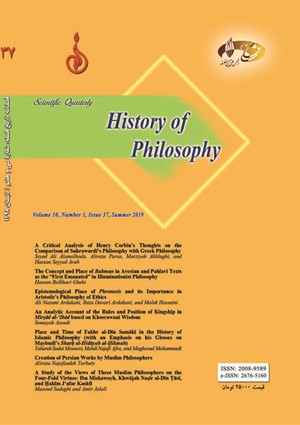-
-
List of Articles
-
Open Access Article
1 - Creation of Persian Works by Muslim Philosophers
Alireza Najafzadeh -
Open Access Article
2 - A Study of the Views of Three Muslim Philosophers on the Four-Fold Virtues: Ibn Miskawayh, Khwājah Naṣīr al-Dīn Ṭūsī, and Ḥakīm J‘afar Kashfī
Masoud Sadeghi amir jalali -
Open Access Article
3 - A Critical Analysis of Henry Corbin’s Thoughts on the Comparison of Suhrawardī’s Philosophy with Greek Philosophy
Hasan Seyedarab seyedali Alamolhoda Alireza parsa Akhlaghi Marzie -
Open Access Article
4 - The Concept and Place of Bahman in Avestan and Pahlavi Texts as the “First Emanated” in Illuminationist Philosophy
Hasan Bolkhari Qehi -
Open Access Article
5 - Epistemological Place of Phronesis and its Importance in Aristotle’s Philosophy of Ethics
Ali Nazemi Ardakani Reza Davari Ardakani Malek Hosseini -
Open Access Article
6 - Survey of Fakhr Al Din Sammki’s paraphrase on Meibodi’s commentary of Hidayat al Hikmah
Taherehsadat mousavi mahdi najafi afra Maghsoud Mohammadi -
Open Access Article
7 - Editor's Note
Hossein Kalbasi Ashtari -
Open Access Article
8 - An Analytic Account of the Rules and Position of Kingship in Mirṣād al-‘Ibād based on Khosrawani Wisdom
Somayeh Assadi
-
The rights to this website are owned by the Raimag Press Management System.
Copyright © 2017-2026







